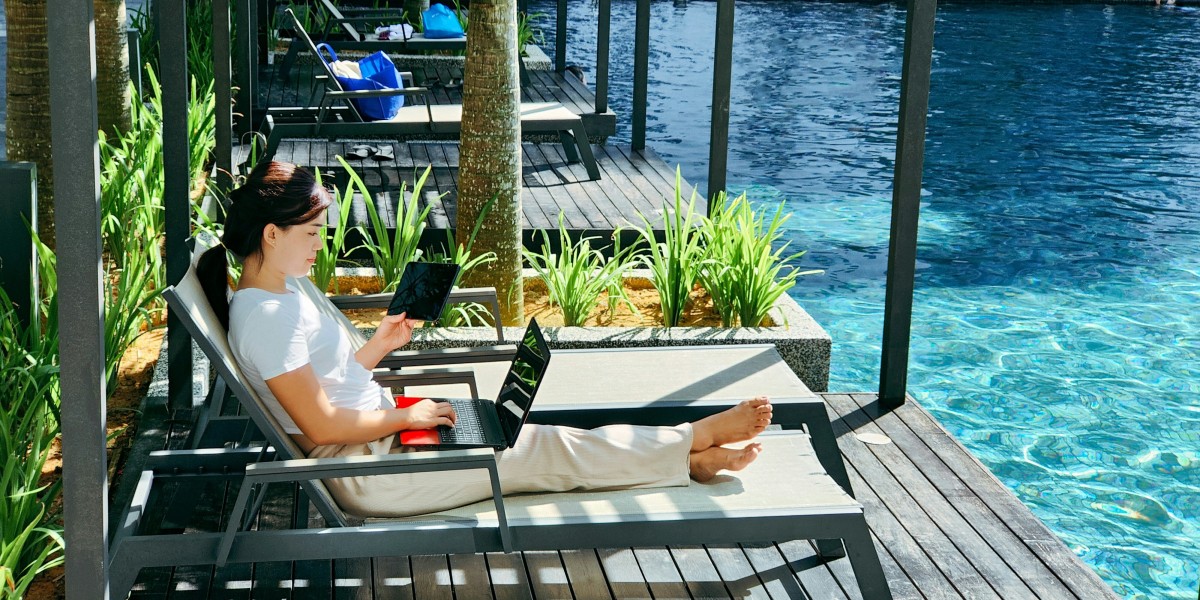The laptop-wielding traveller checking into hotels in Fort Colombo today looks nothing like the typical tourist of a decade ago. They are not rushing off to catch a tour bus or squeezing sightseeing into a tight itinerary. Instead, they are settling in for weeks or months, seeking reliable Wi-Fi, a comfortable desk, and a place that feels like a temporary home base. This is the new face of travel, and Sri Lankan hotels that recognise this shift stand to benefit enormously from one of the most significant changes in how people work and live.
The Quiet Revolution Reshaping Tourism
The remote work revolution, accelerated dramatically by the pandemic, has fundamentally altered the hospitality landscape. What started as a temporary response to global lockdowns has evolved into a permanent fixture of modern work culture. Millions of professionals worldwide now have the freedom to work from anywhere with an internet connection, and many are choosing to do exactly that. For Sri Lanka, with its stunning landscapes, rich culture, affordable cost of living, and improving digital infrastructure, this represents a golden opportunity that extends far beyond the traditional tourist season.
The numbers tell a compelling story. Digital nomads typically stay longer than conventional tourists, often booking accommodations for a month or more rather than a few nights. This extended stay model provides hotels with more predictable revenue streams and reduces the costs associated with constant guest turnover. A room that might sit empty during the off-season can now be filled by a remote worker who values the destination precisely because it is less crowded and more affordable during those quieter months.
Beyond the Brochure: What Remote Workers Actually Need
But capturing this market requires more than simply hoping these travellers stumble upon your property. It demands a fundamental rethinking of what hotels offer and how they communicate those offerings. The digital nomad is not looking for the same amenities as a honeymooning couple or a family on vacation. They need workspace functionality married with residential comfort. They want to feel productive during the day and relaxed in the evening. They are seeking a blend of hotel convenience and apartment practicality that most traditional properties do not currently provide.
Wi-Fi Is not an Amenity—It is the Foundation
The foundation of any successful remote work offering is internet connectivity that actually works. This might seem obvious, but too many hotels still treat Wi-Fi as an afterthought, providing barely functional connections that struggle under the weight of video calls and large file uploads. For remote workers, internet reliability is not a luxury—it is the basis of their livelihood. Hotels serious about this market need to invest in robust, fibre-optic connections with backup systems. Each room should offer speeds fast enough for seamless video conferencing, and the connection should remain stable throughout the day. Testing your network under heavy load, preferably with actual remote workers providing feedback, can reveal weaknesses before they drive away potential long-term guests.
Designing Rooms Where People Actually Want to Work
Beyond connectivity, the physical workspace matters immensely. The typical hotel desk—a small, decorative surface tucked in a corner—will not cut it for someone spending eight or more hours a day working. Proper ergonomic chairs are not just nice to have; they are essential. Good lighting that does not cause eye strain, accessible power outlets positioned for practical use rather than aesthetic appeal, and enough surface area to spread out a laptop, notebook, and perhaps a second monitor all contribute to making a room genuinely work-friendly. Some forward-thinking properties are going further, creating dedicated co-working lounges within the hotel where guests can choose between working in their rooms or in a more collaborative environment.
The Art of Living, Not Just Staying
The concept of hotel rooms in Colombo that cater to extended stays also needs to embrace residential touches. A mini-fridge becomes crucial when someone wants to store groceries for breakfast or keep healthy snacks on hand. A kettle or coffee maker shifts from luxury to necessity when the guest is not running out for morning meetings but rather rolling out of bed and logging on. Small kitchenettes, even just a two-burner cooktop and basic cookware, can transform a hotel room into a viable long-term option for budget-conscious digital nomads who can't afford to eat out three meals a day for months on end.
Flexibility as a Feature, Not a Favor
Flexibility in both booking and services represents another key differentiator. Traditional hotel models built around nightly rates do not align well with how remote workers think about accommodation. Weekly and monthly rates that offer genuine value, not just a token discount, make properties more competitive with apartment rentals. Flexible check-in and check-out times acknowledge that someone staying for a month does not operate on the same schedule as a tourist catching an early flight. Housekeeping services that can be adjusted—perhaps weekly deep cleans rather than daily tidying—respect both the guest's need for privacy and the hotel's operational efficiency.
Speaking Their Language: Marketing to the Modern Nomad
The marketing approach for attracting this demographic differs significantly from traditional hotel promotion. Digital nomads do not typically browse travel agent packages or respond to conventional advertising. They hang out in online communities, read blogs written by other remote workers, and make decisions based on recommendations from peers who've actually worked from these locations. Creating content that speaks directly to their needs—blog posts about the best cafes with Wi-Fi in the area, guides to obtaining visas for extended stays, information about coworking spaces and networking events—positions your hotel as understanding their lifestyle. Many properties offering Colombo hotel offers might not realise that packaging accommodation with coworking space access or including local SIM cards with data plans could be far more appealing to this market than spa credits or complimentary cocktails.
Building Ecosystems, Not Just Offering Rooms
Partnerships amplify what individual hotels can offer. Collaborating with local coworking spaces means guests can access professional work environments even if your property does not have dedicated facilities. Relationships with gyms, yoga studios, or sports clubs provide wellness options that matter enormously to people who are essentially living in your hotel rather than just passing through. Connections with local restaurants willing to offer regular customer discounts or meal plans create dining flexibility. Even partnerships with language schools or cultural centres can add value for digital nomads looking to immerse themselves more deeply in Sri Lankan culture during their stay.
Community: The Unexpected Competitive Advantage
The community aspect shouldn't be underestimated. Remote workers, despite the stereotype of isolated laptop dwellers, often crave connection and collaboration. Hotels that facilitate this—through regular networking events, communal dinners, or simply by maintaining common areas conducive to chance encounters—create sticky experiences that lead to positive reviews and return visits. A digital nomad who finds not just accommodation but community at your property becomes an advocate who brings friends and colleagues on subsequent trips.
Making the Numbers Work for Everyone
Pricing strategies for this market require nuance. While normal rooms in Colombo might be priced at standard tourist rates, competing for the remote work market means understanding what these travellers can afford and what they are comparing you against. They are not just looking at other hotels—they are weighing your monthly rate against Airbnb apartments, co-living spaces, and even just staying put in their home country. The value proposition needs to be clear: what you offer for that monthly rate, including utilities, Wi-Fi, cleaning, and amenities, needs to pencil out favourably compared to alternatives. Transparent pricing that includes all costs upfront, without surprise fees, builds trust with a demographic that is doing careful spreadsheet calculations about their travel budget.
Regulatory and visa considerations matter too, though hotels can't solve these individually. However, properties that stay informed about visa options for long-term visitors and can guide guests through the process add real value. Sri Lanka has experimented with various visa programs aimed at attracting remote workers, and hotels knowledgeable about current regulations position themselves as helpful partners rather than just places to sleep.
Smoothing Out the Peaks and Valleys
The seasonality that plagues traditional tourism becomes less pronounced when serving remote workers. While tourists cluster their visits around peak seasons and specific holidays, digital nomads often prefer shoulder seasons when accommodation costs less and destinations feel less crowded. A hotel that successfully markets to this demographic can maintain healthier occupancy rates year-round, smoothing out the feast-or-famine cycle that defines so much of the hospitality business.
The Road Ahead
Looking ahead, the remote work trend shows no signs of reversing. If anything, it is expanding as more companies embrace permanent remote or hybrid models and as younger workers entering the workforce expect location flexibility as standard rather than perk. Sri Lankan hotels that adapt now position themselves at the forefront of this shift, building reputations and infrastructure that will serve them for years to come.
The opportunity is real, but it requires genuine commitment to understanding and serving this market differently. It is not about slapping "remote work friendly" on your website while changing nothing substantive. It is about reimagining hospitality through the lens of people who are living, working, and building their lives on the road. The hotels that get this right will not just capture a new market segment—they will redefine what hospitality means in an age where work and travel have become beautifully, permanently intertwined.







